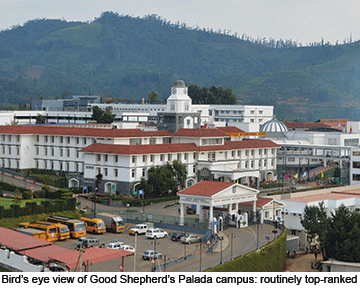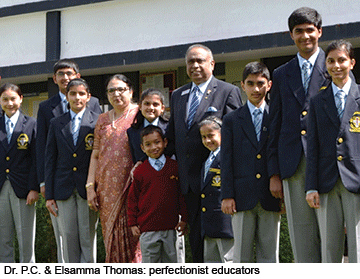An unapologetically legacy boarding school with strong emphasis on pomp, circumstance and conservative values, GSIS has set its sights on competing with the best residential schools worldwide
 On October 15-16, Good Shepherd International School (GSIS, estb.1977), Ootacamund (aka Ooty, pop. 100,000) celebrated its 38th Founders Day (the birthday of Dr. P.C. Thomas, founder principal) with extraordinary pomp and circumstance, probably unmatched in K-12 education countrywide.
On October 15-16, Good Shepherd International School (GSIS, estb.1977), Ootacamund (aka Ooty, pop. 100,000) celebrated its 38th Founders Day (the birthday of Dr. P.C. Thomas, founder principal) with extraordinary pomp and circumstance, probably unmatched in K-12 education countrywide.
The chief guest of the two-day celebrations of this grade I-XII fully residential school, affiliated with the Delhi-based CISCE, the UK-based CIE and Geneva-based IBO examination boards, was Lt. Gen. Sunil Kumar Gadeock, AVSM — commandant, Defence Services Staff College, Wellington (and Mrs. Sonalika Gadeock) — who witnessed a variety of indoor entertainment programmes in the school’s massive 1000-seat auditorium on October 15. The next day, Gen. Gaedock in full ceremonial uniform reviewed an all-school parade by open jeep and later took the salute of a march past presented by the horse contingent, sea cadet corps, flag contingent, four houses of the school, and the school’s two brass and two pipe bands.
According to monitors of the education scene in Ooty — a well-known hub of K-12 education which hosts over 35 schools of all types — such pomp, style and circumstance are normative in GSIS, a legacy boarding school which provides its 725 students, including 225 girls, excellent globally benchmarked academic, co-curricular and sports education.
GSIS sprawls over two green campuses — Fernhill (40 acres), built around the fully-refurbished summer palace of the former Maharajah of Baroda which hosts primary (grade I-VI) students, and the Palada campus (140 acres) for middle, high and higher secondary students. Since it was started in 1977 by Dr. P.C. Thomas and his wife Elsamma with an initial batch of 54 children, GSIS has been developed into one of India’s most respected new genre international schools, routinely ranked among the Top 10 countrywide. In the EducationWorld India School Rankings 2014, GSIS was ranked #5 in India in the category of international co-ed wholly residential schools below a handful of foreign missionary schools established more than a century ago.
However, Dr. Thomas a science, education, and English postgraduate of Kerala University with a doctorate in education management from Pacific Columbia University, California, who began his career as an English teacher, is unfazed by GSIS’ rank in the EW league tables and is resolute in his belief that the school is the country’s premier fully residential international co-ed school. “There are several unique differentiating features of GSIS which are perhaps insufficiently known or appreciated.
First, GSIS is an uncompromisingly residential school with even children of staff residing in our dormitories. Secondly, GSIS is an entirely self-sufficient institution with all vegetables, poultry, eggs and milk supplied from our own organic farms. Third, it’s highly improbable that any other school countrywide offers matching enabling infrastructure and learning environments — two green campuses spread over 180 acres with extensive facilities for academics, sports and games, music and dance, fine arts, mountaineering and camping, and a teacher-pupil ratio of 1:4. All this enables us to provide a finely balanced education comparable with the best primary-secondary schools worldwide,” he says.
Certainly, to a first-time visitor the stark white Doric buildings surrounded by lush green playing fields and supplier farms interspersed with prize winning rose gardens, present an awe-inspiring vista. This impression is sustained by the carefully designed wood panelled interiors of the reception lounges and administrative offices, and the spacious, natural light and well-ventilated, smart boards-equipped 20 classrooms, six science, three computer, four language and two maths labs housed in the academic block of the senior school.
This splendid academic infrastructure is supplemented with a library of 50,000 volumes, 110 journal subscriptions and 30 Kindle e-readers. There are also four state-of-the-art audio-visual theatres. Given this supportive academic infrastructure and a highly-qualified faculty of 200 teachers of whom 90 percent have postgraduate qualifications, it’s unsurprising that GSIS students fare well in the exams of their affiliating boards.
Of the 21 students who wrote the ISC school-leaving grade XII exam of CISCE, this year, 14 passed with distinction, and of the 39 who wrote the IB Diploma exam of IBO, Geneva, the school’s average was substantially higher than the world average.
Yet perhaps the most striking differential of GSIS is the massive investment the school management has made in co-curricular — especially music and performing arts — education. Every year, about 500 students of the school are tested by Trinity College, London for their music theory and practical accomplishments in wind, string, and percussion instruments as well as piano and keyboard. GSIS boasts three pipe and as many brass bands and a full-fledged symphony orchestra. Western or Indian classical music and other performing arts education is compulsory for all students from grade III onwards.
Given the GSIS management’s emphasis on substantive holistic education, sports and games options are available in abundance on the school’s sprawling playing fields and two indoor sports complexes. Apart from play and practice grounds for field games — hockey, cricket and football — facilities are also provided for more exotic sports such as mountaineering, equestrian (30 thoroughbred horses), rifle shooting (two ranges), tennis (ten all-weather courts), golf (a nine-hole course) and swimming (two heated pools). Indoor sports options include basketball, badminton, squash, aerobics and gymnastics. Moreover, to mentor and train students in sports of their choice, GSIS employs 24 National Institute of Sports (Patiala and Delhi)-certified coaches.
“GSIS is a secular institution founded on liberal universal values. We have no hesitation in describing GSIS as a traditional boarding school with strong emphasis on discipline, good manners, uniforms for all occasions, and conservative values,” says Elsamma Thomas, an alumna of Kerala University and co-founder of GSIS who supervises the vital function of pastoral care for its 725 students, and also manages the state-of-the-art Good Shepherd Finishing School for Girls (estb. 2003) which transforms post-secondary “girls into ladies” on an adjacent fully-equipped 21-acre campus.
Although the school experiences a rush for admissions into primary classes every year (500 applications for the annual intake of 100), Dr. Thomas whose philosophy and practice is to reinvest all surpluses and savings into institutional development, rules out the option of replicating GSIS. “We aren’t keen on increasing the number of students or promoting new schools. Instead, our growth and development plans are centred around expanding and improving our academic and sports and games facilities. Right now, we are in the process of developing a new cricket ground and upgrading our indoor sports facilities,” he says.
Quite clearly, this perfectionist educator has set his sights on competing with the best residential schools worldwide.
|
Admission & Fees
Good Shepherd International School, Ooty is a grade I-XII fully residential school affiliated with the CISCE (grade X and XII), CIE, UK (grade X) and IBO, Geneva (grade XI-XII) examination boards.
Admission forms for grade I-VIII and grade XI are available on the school website (www.gsis.ac.in). Grade IX admissions are against vacancies.
Tuition fees: Rs.5-10 lakh per year.
The Good Shepherd Finishing School offers courses ranging from six weeks to nine months for higher secondary school-leavers and graduate women (Rs.2-5 lakh).
For further information contact 91 423 2550071 email: info@gsis.ac.in |
Dilip Thakore